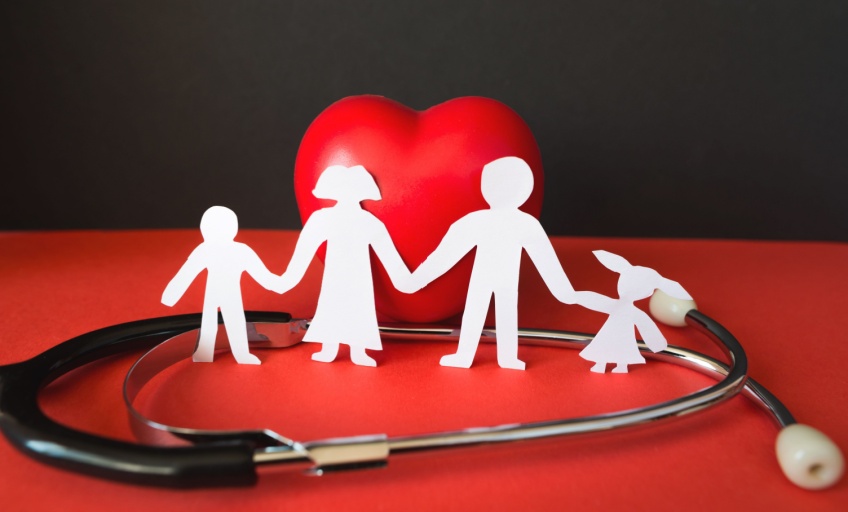The bacteria and other microbes in your gut help you digest food and may support immune, heart, and brain health, among other benefits.
What you need to know:
- The gut-heart connection
- How does gut health influence heart health?
- 4 Nutrition tips for a healthy microbiome
- Other factors affecting gut health
The gut-heart connection
Let us explore the gut-heart connection. The gut and heart are connected in many ways, including:
- Gut bacteria: The gut microbiome, or the group of microbes in your gastrointestinal tract, can affect heart health. Changes in the gut microbiome can be associated with high blood pressure, low HDL cholesterol, heart disease, heart attacks, strokes, and heart failure.
- Fiber: Fiber-rich diets can help lower the risk of heart disease and stroke. It binds fat and cholesterol in the small intestine, which can lower blood cholesterol levels.
- Gastrocardiac syndrome: This condition involves stomach issues that can trigger heart palpitations.
- Blood pressure regulation: Gut bacteria produce chemicals affecting blood pressure regulation.
Inflammation: Gut microbiota play a critical role in inflammation, which is widely associated with cardiovascular disease.
How does gut health influence heart health?

Gut health can influence heart health in several ways, including:
- Cholesterol levels: Some gut bacteria, may lower cholesterol levels. They may also reduce triglycerides and glucose, and increase HDL.
- Heart rate variability: Variations in gut microbiota may affect heart rate variability and the risk of arrhythmias.
- Red meat consumption: Red meat is a major source of trimethylamine (TMA), a nutrient that gut microbes feed on. In the liver, TMA is converted to trimethylamine N-oxide (TMAO), which some research suggests may be linked to artery-clogging plaque.
4 Nutrition tips for a healthy microbiome
Poor gut health may manifest as fatigue, upset stomach, skin conditions, and autoimmune challenges. Here are some nutrition tips that can help:
Fermented foods and probiotics
Probiotics, a certain type of friendly bacteria, provide health benefits when eaten. You can get probiotics from supplements, as well as from foods prepared by bacterial fermentation. Fermentation is a process in which bacteria and yeast break down sugars. Not only does fermentation enhance food preservation, but eating fermented foods can also boost the number of beneficial bacteria, or probiotics, in your gut. Fermented foods examples include:
- Kimchi
- Sauerkraut
- Yogurt
- Kefir
Prebiotic-rich foods
Prebiotics provide food to promote the growth of beneficial bacteria in the gut. They help with various digestive problems and even boost your immune system. Prebiotic foods also improve metabolic health and even help prevent certain diseases. Here are a few healthy foods rich in prebiotics:
- Garlic
- Onions
- Asparagus
- Bananas
- Barley
- Oats
- Apples
- Cocoa
- Flaxseeds
- Wheat bran
- Seaweed
- Avocado
Limiting processed foods and sugars
A diet high in processed foods like cakes, chips, cookies, pizza, and added sugars can decrease the amount of ‘good’ bacteria and diversity in your gut. Research suggests that eating a lot of sugar may increase the inflammation in your body. Inflammation can be the precursor to several diseases. If you eat high amounts of sugar, your gut health may be compromised.
Staying hydrated

Drinking plenty of water may be linked to increased diversity of bacteria in the gut, though the source of the water also matters. One study found that people who drank more water had less of a type of bacteria that can cause gastrointestinal infections. Staying hydrated benefits your overall health and can help prevent constipation. It may also be a simple way to promote a healthy gut.
Other factors affecting gut health
Other factors that can affect your gut microbiome include:
Stress management
Chronic high stress levels are hard on your whole body, including your gut. A few ways to lower stress may include:
- Meditating
- Walking
- Getting a massage
- Spending time with friends or family
- Diffusing essential oils
- Limiting alcohol intake
- Laughing
- Practising yoga
- Spending time with a pet
Sleep
Not getting enough sleep may seriously impact your gut health, contributing to more sleep issues. Try to prioritize getting at least 7–8 hours of uninterrupted sleep per night. Your doctor may be able to help if you have trouble sleeping.
Antibiotics
Research says some antibiotics can kill healthy gut bacteria during use. It says the lack of healthy gut bacteria can lead to gastrointestinal ailments and recurring infections. People taking antibiotics should eat foods rich in probiotics, such as yogurt while using the medications.
The health of your gut is intricately linked to that of your heart. Maintaining a healthy gut through the abovementioned methods can reduce the risk of heart disease and improve overall well-being. Prioritizing gut health is, therefore, not just good for digestion – it is also a key factor in protecting your heart.
Stay tuned to the Activ Living Community. Keep up to date with the latest health tips and trends through expert videos, podcasts, articles, and much more on nutrition, fitness, mindfulness, and lifestyle conditions like Asthma, Blood Pressure, Cholesterol, and Diabetes. Activ Living ke saath sahi sehat ki shuruat ABHI karo.
You may also be interested in the following blogs:
Popular Searches
How to lower blood pressure | Fruits good for liver | Unhealthy foods | Ragi Benefits | Basal Metabolic Rate | Acupressure points for High Blood Pressure | Ayurvedic medicine for blood pressure | How to control cholesterol at home | Homeopathy for Asthma | Biological Age | Home remedies for TB | Natural beta blockers | Negative effects of internet | Types of walking | Blood pressure calculator | Blood sugar calculator | BMI Calculator





 1800-270-7000
1800-270-7000








